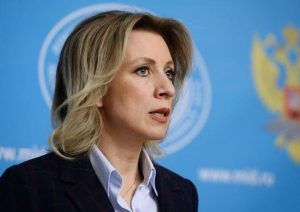Afghan Gov’t Responsible for Disruption of Qatar Meeting
We consider the reason for the disruption of the Doha meeting to be the unconstructive position of the current leaders of Afghanistan, which sent a delegation to Qatar that a priori did not fit in the format of the event and caused discontent among many participants, including the main opponents, the Taliban.

Russian Foreign Ministry Spokeswoman Maria Zakharova
It was recently announced that the second meeting of the intra-Afghan dialogue, which was scheduled to take place in Doha, Qatar, on April 19-21, has been cancelled.
We regret this decision of the organisers because this intra-Afghan format has proved to be the most promising communications channel between various political forces in Afghanistan, including the current Government and representatives of the armed opposition represented by the Taliban. I would like to remind you that the first meeting of the intra-Afghan dialogue took place in Moscow on February 5-6, and that it was quite successful. During the meeting, without any external interference, prominent Afghan politicians and Taliban representatives initiated a dialogue about the future shape of the post-conflict Afghanistan. The abolition of such a dialogue can have negative consequences for the large-scale intra-Afghan peace process.
We consider the reason for the disruption of the Doha meeting to be the unconstructive position of the current leaders of Afghanistan, which sent a delegation to Qatar that a priori did not fit in the format of the event and caused discontent among many participants, including the main opponents, the Taliban. We believe that dictating the terms of holding the intra-Afghan meeting does not correspond to the statements by the current Afghan Government about its intention to launch a constructive conversation for the sake of the future of Afghanistan.
We hope that Afghans will eventually manage to resolve the difficulties themselves and return to the dialogue that may prove to be seminal for their country.
Debates in the Parliament of the Netherlands on providing shelter to Afghan citizens who cooperated with the Dutch military contingent in that country.
We noted the heated debates in the Parliament of the Netherlands on the provision of shelter to the citizens of Afghanistan who cooperated with the Dutch military contingent in that country.
It turns out that there are some 200 of such people and only ten of them have been given shelter in the Netherlands. The rest of them, as MPs said, cannot overcome the complex bureaucratic procedures required by the country’s migration law.
In the meantime, many of these Afghans have been captured by Taliban militants; four of them have been tortured and killed. However, Dutch Minister of Defence Ank Bijleveld has relieved her ministry of the responsibility for the deaths of these people, referring to the complexity of migration procedures that must be carried out by all foreigners who request shelter.
We noted that such disrespect towards like-minded people and assistants from Afghanistan is not only common for the Dutch, but also for some other countries that are part of the international military contingent in Afghanistan. When leaving the country, the international coalition abandons its friends as it no longer needs them, and leaves them one-on-one with extremists. This again shows the true price of the ‘friendship’ that the West declares it has with the Afghan people. It leads to the disappointment of people in Afghanistan, their radicalisation and, as a result, the expansion of the social base of the armed opposition.
In our opinion, the above-mentioned situation is not a coincidence. It reflects the general attitude of the NATO countries towards the Afghan war. While losing the war, many of them are ready to abandon the country to the whims of fate and to leave its people to deal with the problems the coalition created.
Such an approach is especially dangerous in the run-up to the eventual withdrawal of foreign troops from Afghanistan and contradicts the stated intent of the US and its NATO allies to do this ‘responsibly.’ We urge them to prevent new tragedies that are directly related to their military presence on Afghan territory.